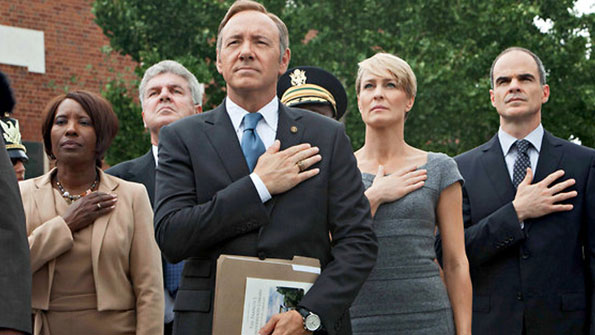Mobile TV Challenges Broadcast - Netflix's House of Cards vs. HBO

It seems like just yesterday (OK last year) that many in the media, including yours truly, were predicting new programming to launch via mobile TV and streaming before broadcast. I guess you could say the future is here — and although there have been various other launches of non-broadcast programming, none has made a bigger splash than Netflix’s new series "House of Cards" starring Kevin Spacey.
While traditional pay broadcasters push toward streaming and mobile with varying degrees of success, Netflix is already there and going full force in carving out a slice of the programming pie. CEO Reed Hastings has stated he wants to “become HBO faster than HBO becomes Netflix”. I think that actually is going to happen. HBO Go is the streaming service that is available on set-top boxes as well as streaming mobile devices such as iPad, iPhones and Android devices. The big catch is that you need to already have HBO to use the service, which does not make too much sense because a lot of what is on HBO Go is also on HBO On Demand, which you get when you subscribe to HBO in the first place. The problem is HBO is not available separate from a satellite or cable subscription. If you want HBO on the go, you need to become not only a subscriber of the channel, but a subscriber of some sort of package from a local carrier. In that respect, HBO Go can never grow any larger than the current HBO subscriber base. And cable and satellite providers are surely not going to let HBO slide out of current contracts, because if consumers can sidestep a $99 package and just choose a $10 a month channel, chances are they will go for it.
Netflix has already announced that the reboot of "Arrested Development" has been shot and will be launched in the coming months, and this month it has debuted its newest series, "House of Cards." It has sunk some decent money into it, reportedly $100 million for two 13-episode seasons. Netflix has already stated its plan to release at least 5 new series this way each year. So if you fast forward to say two years from now, you suddenly have 10 shows, 130 episodes of programming, that you can only find on Netflix streaming. It only takes one hit, like a True Blood or Sopranos, to get hundreds of thousands of new signups just to see the show. And unlike HBO, it does not have to split half its profits with any cable company. Netflix currently has more than 33 million subscribers, so in a sense it already is a top network. But top networks need exclusives, and that is the game plan with this new group of premiere shows.
Because millions of Netflix users watch on iPads and other mobile devices, this makes "House of Cards" one of the largest mobile TV launches so far. In fact, Netflix releases all episodes at once, all 13 episodes of "House of Cards" are now available, so just like any other series on Netflix, you can burn through them on a bender once you get hooked. The fact that a new series is premiering first on mobile television should not be overlooked by broadcast content creators: Getting series programming on Netflix is often easier than getting a series on HBO, so it’s worth investigating this growing target demographic.
One key difference from HBO is that Netflix is not doing an episode a week, they are putting them all out there at once. I am not sure if this is best, it could go either way. Weekly episodes can build momentum and get new viewers roped in as water cooler conversations take place. However, if viewers don’t get hooked early (such as with HBO’s quickly canceled Luck starring Dustin Hoffman) it could be a rough ride to build momentum. Having all episodes available to stream at once allows for convenient viewing, but the truth is, many will blow through the season in less than a week. Leaving them waiting for the next Netflix series, which could be months away.
In the end, Netflix is on the right path. Channels and networks are almost always built around exclusives, shows you can’t get anywhere else. Streaming services often get hand-me-down shows that have already aired, and are not exclusive. But Netflix aims to change that. The company is focused on building up a whole roster of exclusive series programming that will debut on mobile (tablets and phones) and streaming devices such as Smart TVs, Roku and Apple TV. HBO may not be overly concerned with this new surge of competition just yet, but in 2 to 3 years, with 3 or 4 big hit Netflix shows, the landscape could definitely be changing.
The professional video industry's #1 source for news, trends and product and tech information. Sign up below.
